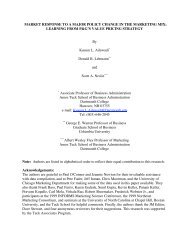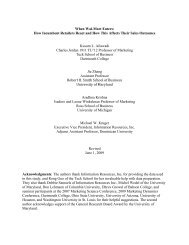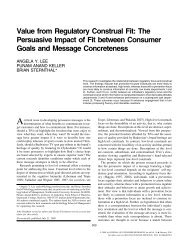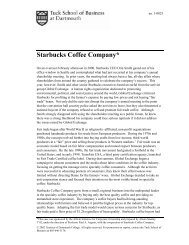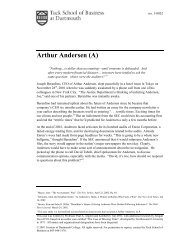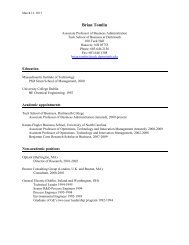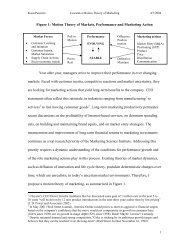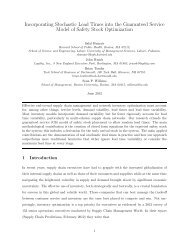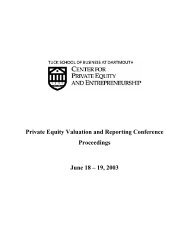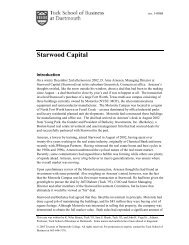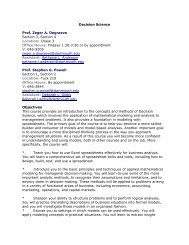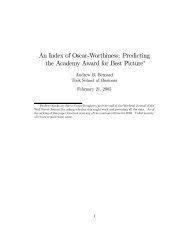tax notes international - Tuck School of Business - Dartmouth College
tax notes international - Tuck School of Business - Dartmouth College
tax notes international - Tuck School of Business - Dartmouth College
You also want an ePaper? Increase the reach of your titles
YUMPU automatically turns print PDFs into web optimized ePapers that Google loves.
FEATURED PERSPECTIVES<br />
We, the <strong>tax</strong>payers, are now in a situation in which<br />
not only are we giving the banks money to lend to<br />
businesses, we are also going to relieve the banks <strong>of</strong><br />
most <strong>of</strong> the risk <strong>of</strong> lending. I can’t help but ask why<br />
we now need the banks at all. The government could<br />
just cut out the middlemen and take over the banking<br />
sector, lock, stock, and barrel.<br />
Of course there is one sector that is immediately<br />
affected by the reduction in base rate — those with<br />
savings. The banks and building societies have taken<br />
the opportunity to reduce interest rates paid to investors,<br />
though some have not passed on the full reduction.<br />
Nevertheless, it was recently reported that some<br />
40 percent <strong>of</strong> savings accounts were paying less than 1<br />
percent and 26 percent were paying less than 0.5 percent.<br />
If rates on the majority <strong>of</strong> accounts get much<br />
lower, investors may well consider withdrawing all their<br />
savings and keeping them under the floorboards. At<br />
least there the money will not be at the mercy <strong>of</strong> the<br />
bank and they can derive pleasure from taking it out<br />
and counting it every once in a while. If we ever experience<br />
deflation, as the more pessimistic have<br />
claimed, the investors will find their savings’ purchasing<br />
power increased and there would be no <strong>tax</strong> to pay!<br />
As savings income is dropping, there is clearly going<br />
to be a drop in the income <strong>tax</strong> receipts on that income,<br />
which is why the Conservatives’ latest <strong>tax</strong> policy seems<br />
an empty gesture. The proposal was to exempt savings<br />
income from income <strong>tax</strong> for all but those who pay <strong>tax</strong><br />
at the highest rate <strong>of</strong> 40 percent (currently those who<br />
have a total <strong>tax</strong>able income, after the deduction <strong>of</strong> allowances,<br />
<strong>of</strong> £36,000 and above). This, coupled with a<br />
large increase in the personal allowance for those over<br />
65, was stated to be to help the ‘‘innocent victims <strong>of</strong><br />
the downturn.’’ All very laudable, but would it really<br />
be <strong>of</strong> any help at a time when there is little or no income<br />
to be exempted? The cynic in me thinks this is<br />
just posturing before an expected spring general election.<br />
The real practical help for these times has taken the<br />
form not <strong>of</strong> rate cuts, which are unlikely to stimulate<br />
the economy and in any event would have a delayed<br />
impact, but <strong>of</strong> allowing businesses to spread their <strong>tax</strong><br />
payments over an agreed period. This was a measure<br />
announced in the prebudget report with the setting up<br />
<strong>of</strong> the HM Revenue & Customs’ <strong>Business</strong> Payment<br />
Support Service (BPSS). The objective at the time was<br />
to enable ‘‘businesses in temporary financial difficulty<br />
412 • FEBRUARY 2, 2009 TAX NOTES INTERNATIONAL<br />
(C) Tax Analysts 2009. All rights reserved. Tax Analysts does not claim copyright in any public domain or third party content.



